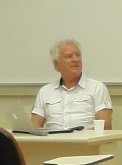
Publicado em: 19/03/2014
Prof. Peter Gardenfors concede entrevista para o INF

Foto : Setor de Comunicação
O professor Peter Gardenfors da University of Lund – Sweden visitou o Instituto de Informática, nos dias 17 e 18 de março, e concedeu a entrevista:
1. What do you think of the research in Computer Science in Brazil?
I don’t have that much experience with Brazilian computer science. I have mainly been in contact with people working in different ares of logic, such as non-monotonic reasoning or paraconsistent logics. Still my general impression is that Computer Science in Brazil if of high international standard. One difference in comparison to my own country Sweden that I have noticed is that computer scientist often work in close collaboration with industry.
2. Can you summarize the main point of your book “How Homo became Sapiens”? Are there plans for a Portuguese translation soon? In how many languages has your book been translated to?
This book has very little to do with computer science (although there are some connections to robotics). It is about the evolution of human thinking – what makes us unique as cognitive beings. I focus on two topics: our ability to plan for future needs and our ability to understand what goes on in other people’s minds. Wtithout these capacities a language can not evolve and they explain why humans are the only animals who have a symbolic language. Thanks to Renata Vieira, the Portuguese translation of the book will soon be published, This is the seventh language of the book.
3. How do you see your field of research in ten years from now?
My main research area is models of concept formation, in particular conceptual spaces. I have recently published a book with the title The Geometry of Meaning (MIT Press 2014) where I use conceptual spaces to develop a semantics for natural language, in particular for the roles of different word classes. This book connects cognitive science to linguistics and I will continue to work in this area. I have recently also started working on implementations of conceptual spaces in robotics and I believe this interest will grow in the future, in particular in the field of human-robot-interaction. Then I also have an interest in the evolution of human cognition. Here I want to continue working on the role of cooperation for the evolution of language and on the evolution of teaching. Another old interest of mine that may pop up again is decision theory.
4. Any advice for young researchers?
1. Think for yourself! Don’t be too dependent on the old guys and don’t be afraid of them. Trust in your own competence.
2. Be stubborn! If you believe in an idea, don’t give it up, even if you meet criticism. But be prepared to revise your ideas.
3. Learn to evaluate what is worth working on and what is a waste of time! (This is a piece of advice that is very difficult to implement, but I think it distinguishes a good researcher form a mediocre one.)
Link da página do professor: www.lucs.lu.se/Peter.Gardenfors
